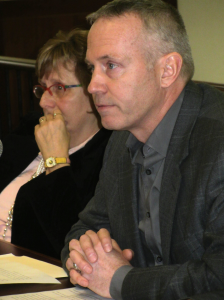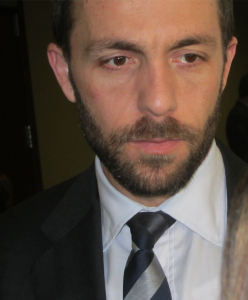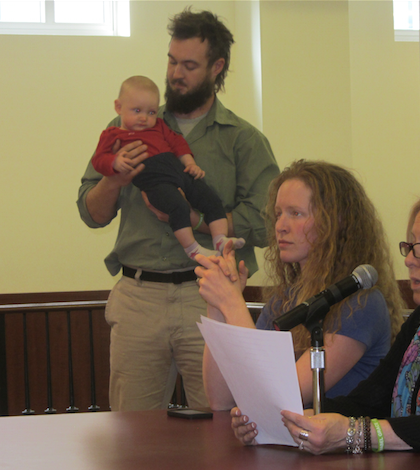Standing patiently in the chamber of the Nassau County Legislature, Jeff Decker had his hands full as his 7-month-old daughter Mabel squirmed in his arms. His wife Carly Tangney Decker and his mother-in-law Cindy Tangney were testifying at a public hearing held a week before Christmas on a bill to authorize the medical use of marijuana in New York.
Mabel has a rare genetic disorder that causes her to suffer severe epileptic seizures. Her family had driven down from upstate Kingston to tell the Assembly Health Committee’s chairman Richard Gottfried (D-Manhattan), who is co-sponsoring the bill, known as the Compassionate Care Act, with state Sen. Diane Savino (D-Staten Island), that they were leaving that night for Colorado because they had learned that they could legally obtain a marijuana derivative there that had shown promise in treating early onset epilepsy.
“Maybe when we get there, it won’t work,” said Mabel’s mom, fighting back tears. “But at least at that point we can say we did our best—we tried everything.”
Known as Charlotte’s Web, this special strain of marijuana oil has been the subject of a recent article in The New York Times as well as a CNN special by Dr. Sanjay Gupta, which detailed how young Charlotte Figi of Colorado had benefitted from its use. In fact, Charlotte’s mother, Paige Figi, had flown in from Colorado to tell the Assembly committee hearing how the medical marijuana had helped. At one point, Charlotte had been having hundreds of grand mal seizures a week.
“From that first dose, she went seven days without a seizure,” Paige Figi said at the hearing.
Also in Mineola was Joel Stanley, who runs the medical marijuana dispensary in Colorado Springs with his brothers that specializes in providing Charlotte’s Web. He told The Times that this oil is low in the psychoactive ingredient THC and high in cannabidiol, or CBD, which is reportedly beneficial. Stanley and his brothers also run the Realm of Caring Foundation, a nonprofit organization that helps subsidize the cost of the drug for qualified needy patients in Colorado, which can run between $150 and $200 for a month’s supply.
Carly Tangney Decker told the health committee hearing that one of the drugs her daughter was prescribed would eventually cause blindness. Uprooting their lives to give Mabel Charlotte’s Web seemed like a better alternative.
“New York won’t allow us to try a medication that is working for many other people,” Carly said. “Please give us the opportunity to try this drug in the comfort of our own state, in our own home, with our families.”
One of the Republicans on the health committee, Dr. Steve Katz (R-Westchester), a veterinarian and an epileptic, told Mabel’s parents, “All I can say is I wish you Godspeed, and that we will do everything possible to bring you home.”
More than 50 people testified in Mineola; the local hearing was the latest front in the national battle over whether to legalize medical marijuana in all 50 states. Gottfried had held a previous hearing on his bill in Buffalo. The witnesses ranged from anguished care-givers like Mabel’s parents to doctors, patients and advocates saying that it’s time New York joined neighboring states like New Jersey and Connecticut, where medical marijuana is legal in the treatment of those with serious health conditions. On the other side were those like Dr. Jeffrey Reynolds, executive director of the Long Island Council on Alcoholism and Drug Dependence (LICADD), who expressed concern that approving marijuana use—no matter whether it was inhaled or digested—would open the door to drug abuse and worse social problems at a time when the agencies responsible for public health are already reeling from severe budget cuts and an epidemic of abuse.
“Here on Long Island the system is at the breaking point and the prospect of policy changes that could potentially fuel further drug misuse, diversion and addiction is quite frankly truly frightening to us,” said Reynolds. “As a native New Yorker, I like to think we can do anything better than other states, but there’s also the question of resources. The bill as currently written places significant responsibility on the New York Department of Health, and its work force is at an all-time low.”

The Compassionate Care Act (A.6357/S.4406) would set up a tightly regulated medical marijuana system in which health-care practitioners licensed to prescribe controlled substances would certify that the patients in need had severe debilitating or life-threatening conditions. So far, 20 states plus the District of Columbia have medical marijuana laws on the books. According to a Siena Research Institute poll in May, 82 percent of New York voters support it here.
Over the years, the Assembly has passed medical marijuana legislation four times with varying degrees of bipartisan support, according to Gottfried. Yet the State Senate has never taken up the bill or even held a hearing on it. But that may soon change.
Blowing In The Wind
On hand for the hearing was the ranking Republican Assemblyman on the health committee, Andrew Raia (R-East Northport), who supports the legislation, though he had opposed similar bills in the past.
“The reason for voting ‘no’ for so many years and now voting ‘yes,’” Raia told the Press, “is because once you have states that have legalized recreational use and you have states right around us…that are legalizing medicinal marijuana, then at what point should we be the last one off the train?”

Raia wasn’t sure how the bill will fare with his Republican friends in the state Senate, considering the uncertain coalition currently holding power. State Sen. Dean Skelos (R-Rockville Centre), the head of the Republican caucus and co-leader of the Senate, did not return repeated calls for comment. Skelos is in a power-sharing role with Sen. Jeff Klein (D-Bronx), who heads the four-member Independent Democratic Conference.
“If you’d asked me two years ago if we were going to be passing minimum wage and gay marriage in the Senate—and basically every single thing the Conservative Party is against,” Raia said, “I would have said it will never happen.
But the Senate majority is not the Senate majority. It’s a Senate majority with a group of four Democrats. And if that’s forcing them a little bit more toward the center, then I guess anything’s possible.”
Savino was optimistic about her bill’s chances in the Senate—and she’s a member of the Independent Democratic Conference.
“Currently, we have far more votes than necessary to pass the bill,” she told the Press in an email. “The real obstacle has been the governor, who has a different marijuana policy issue that he was lobbying for: the decriminalization of small amounts of marijuana in public view.”
She doesn’t see that as a deal breaker in 2014, given that a new mayor and police commissioner in New York City may defuse the public furor over the controversial “stop and frisk” policy there and allow medical marijuana legislation to gain political momentum.
Savino said she’ll be “aggressively pushing this bill this year,” and because “it is a priority for the Independent Democratic Conference…that moves the issue front and center.”
At the hearing Reynolds questioned what he called the legislators’ “political interference with the scientific process,” calling out the bill’s sponsors for making it “clear that the end game is legalization” and “creating the impression that the Legislature knows more than the FDA and the medical professionals in our country…”
As Reynolds told the hearing, “We continue to believe that marijuana should be subject to the same well-controlled clinical trials, scientific scrutiny and oversight as any other approved medicine under the standards of the U.S. Food and Drug Administration, and in line with the Federal Food, Drug and Cosmetic Act of 1938, which was designed to protect consumers from the dangers of ineffective drugs.”
But waiting for FDA approval is a Catch-22, according to Gabriel Sayegh, state director of the Drug Policy Alliance.
“The federal government, the [Drug Enforcement Administration] in particular and the FDA, have created a process that makes it impossible in order to get the studies done… The states say: ‘We can’t wait for Washington to act.’”
Several opponents of the act expressed their sympathy for the parents of children suffering from seizures but worried that allowing medical marijuana to be smoked would fuel addictions.
“I am for Compassionate Care, but my fear is that it becomes a Trojan Horse,” said Max Schwartzberg, a substance abuse therapist living in Brooklyn and a self-described former marijuana addict who told the hearing he represents “those in recovery.”
Another opponent, Alice Joselow, founder of Ossining Communities That Care, wanted the FDA to weigh in before New York approves medical marijuana because “it’s a myth that pot is less harmful than tobacco.” She said she’s seen studies that “smoked marijuana is harming the development of teenage brains.”
That concern prompted the committee chairman to respond.
“I do feel compelled on behalf of some of the parents who have testified here today to say that they would give anything for the opportunity to worry about whether marijuana was affecting teen brain development,” Gottfried said.
“By the time the FDA gets around to thinking that they might want to look at this topic, let alone when they might finish that, hundreds, if not thousands, of children will be dead, and an awful lot more people will be continuing with suffering that they really don’t need.”
One of those witnesses in favor of the bill was Dr. Richard Carlton, a physician in Port Washington who has watched his wife Joan, now 66, suffer with worsening Parkinson’s Disease.
“If you have a loved one with a chronic, debilitating illness that is only partially controlled, if at all, by FDA-approved medications, you will turn over every stone to find alternatives that might possibly be helpful,” said Carlton. “As a physician, I would like my patients to be able to benefit from this remarkable plant without fear of being arrested.”
Jennifer and Gary Ruta of Sayville brought their 28-year-old daughter, Stephanie, to the hearing in her wheelchair and explained how the young woman had been suffering from epilepsy since she had her first seizure when she was 6 weeks old.
“We took Stephanie to the best doctors available,” her mother recounted.
Pharmaceuticals and experimental surgery were the only options Stephanie’s parents had back then, but these methods did not work. The side effects of the medications grew more and more debilitating while her daughter’s condition continued deteriorating.
“Her smiles were gone,” said Jennifer, sadly. “For our daughter’s sake and for the sake of others, we must be advocates for the legalization of the use of medical marijuana.”
Addressing the hearing, Cindy Tangney looked at her granddaughter Mabel.
“Give this sweet baby a chance!” she said. “It’s not about smoking pot.”
Whether their pleas will pass muster in Albany remains to be seen.
























